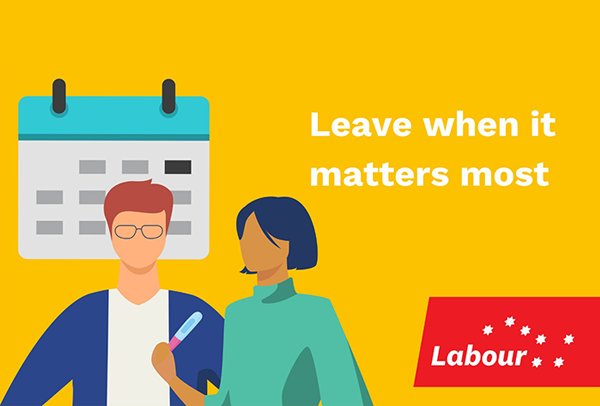More than 14,000 women experience miscarriages each year in this country. One in six couples will go through fertility challenges. Behind these figures are thousands of unique, profoundly difficult experiences that are all too often endured alone.
These are profoundly vulnerable moments for anyone to experience, and for many there is a difficult balance between wanting privacy but needing flexibility and compassion from your workplace during this traumatic time.
This is why Labour published a Bill in March of last year, that would provide 20 days’ leave for women who experience early miscarriage, with an additional 10 days’ paid time off for workers accessing reproductive health treatments, like IVF.
In the very recent past, we’ve seen exactly how positively these measures can impact on workers. When New Zealand introduced paid time off for people experiencing a miscarriage, it sparked a flood of women at home and abroad sharing their experiences of returning to work immediately, without the support of their employer.
For many, the experience of coping with overwhelming grief in the workplace was simply intolerable; incompatible with the basic dignity and support to which every worker should be entitled.
Traditionally, these stories have remained hidden. But a silent ripple is building throughout Ireland, with more and more people coming forward to highlight the pressing need for a compassionate change to the law.
Research from the Irish National Teachers’ Organisation (INTO) found 60pc of their members surveyed had experience of managing reproductive health-related matters during work time.
Currently, employees and their partners are required to use up sick leave or take annual or unpaid leave if they need time off for early miscarriage, or for fertility and other reproductive health-related treatments.
But wanting a family is not an issue that we can leave at the door in the morning. Women do not package up their grief and store it away for later. It is lived at every moment of every day — even when we’re at work.
This lack of support for workers experiencing miscarriage and other fertility issues must be addressed and the time is now. Thankfully, this message is now beginning to be heard.
On the back of our bill and after campaigning by women and couples, the Government has finally begun to inch towards a fairer solution. It is extremely positive to see their announcement that they intend to work with Professor Keelin O’Donoghue and the Pregnancy Loss Research Group, and Labour will push as hard as we can to make sure their recommendations are reflected in law.
We also welcome the long-overdue decision to set aside public funding for IVF treatment after six long years of delay.
But together with the paid treatment we must also look at the employment regulations and structures in place for people and families who need meaningful support during a traumatic time. The Government have shown no interest in legislating for leave for those experiencing fertility treatment so our campaign to get this leave on the statute books goes on.
If we are to end the silence around fertility issues, we need to start with the workplace and continue to follow the path of New Zealand by introducing Labour’s plans for reproductive leave here at home.
Irish society cannot continue to treat miscarriage and fertility treatments in silence.
This is a workplace issue, and our legislation is about affording empathy and dignity to those going through this experience and ensuring accommodation is made for workers when they need it most.
Let’s make sure we keep up this fight and win the right to support and accommodation for every worker affected by fertility challenges or early miscarriage.
If you would like to support this campaign, please sign our petition here
